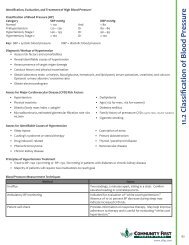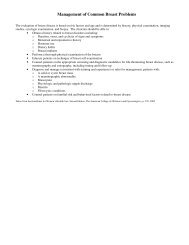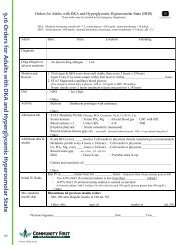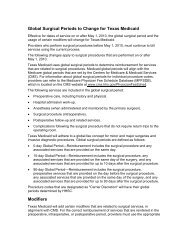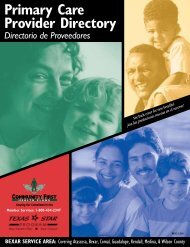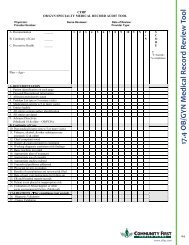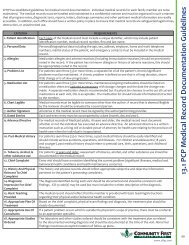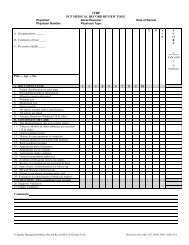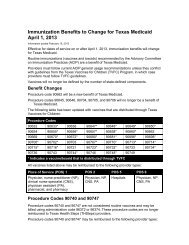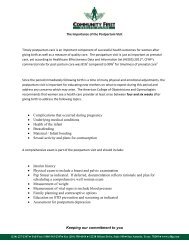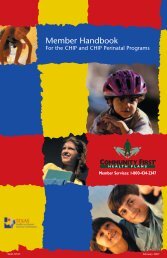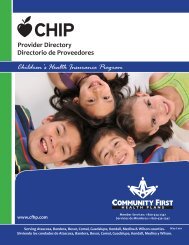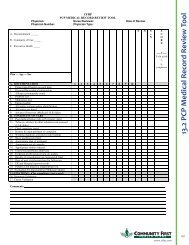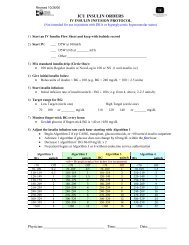Full Clinical Guidelines - Community First Health Plans.
Full Clinical Guidelines - Community First Health Plans.
Full Clinical Guidelines - Community First Health Plans.
Create successful ePaper yourself
Turn your PDF publications into a flip-book with our unique Google optimized e-Paper software.
TEXAS MEDICAID PROVIDER PROCEDURES MANUAL: VOL. 2<br />
CH.52<br />
Mental <strong>Health</strong> Parent Questionnaire (Ages 3–9 Years) (2 Pages)<br />
Mental <strong>Health</strong> Parent Questionnaire (Ages 3–9 Years) (2 Pages)<br />
Mental <strong>Health</strong> Parent Questionnaire<br />
Child’s Name: ____________________________<br />
Birth Date: _______________________________<br />
Ages 3 to 9 Years<br />
Today’s Date: ____________________________<br />
To the Parent: If you will assist us by filling out this form, we can help you find your child’s strengths and any problem<br />
areas, too. Your answers will help us to know if we need to talk with you and find out more about your child. Please<br />
check all items below that are true for your child. Some of the behaviors noted may be normal but if you are concerned<br />
please let us know.<br />
F<br />
e<br />
e<br />
l<br />
i<br />
n<br />
g<br />
s<br />
Does your child show feelings that concern you or seem strange for their age? ❑ Yes ❑ No<br />
❑ Is restless<br />
❑ Is sad or cries easily<br />
❑ Is overly guilty<br />
❑ Lacks remorse<br />
❑ Is irritable, angers or temper tantrums easily<br />
❑ Is sullen<br />
❑ Fearful<br />
B<br />
e<br />
h<br />
a<br />
v<br />
i<br />
o<br />
r<br />
Does your child do things that seem strange for their age? ❑ Yes ❑ No<br />
❑ Has problems in school<br />
❑ Harms other children or animals<br />
❑ Lacks interest in things s/he used to enjoy<br />
❑ Plays sexual games with others, toys, animals<br />
❑ Destroys possessions or other property<br />
❑ Steals<br />
❑ Refuses to talk<br />
❑ Sets fires<br />
❑ Is over-active<br />
❑ Hurts himself or herself<br />
❑ Has been in trouble with the police<br />
S<br />
o<br />
c<br />
i<br />
a<br />
l<br />
I<br />
n<br />
t<br />
e<br />
r<br />
a<br />
c<br />
t<br />
i<br />
o<br />
n<br />
Do you have any concerns about how your child gets along with you? ❑ Yes ❑ No<br />
With other family members or adults? ❑ Yes ❑ No<br />
With playmates? ❑ Yes ❑ No<br />
❑ Withdraws and does not look into peoples’ eyes<br />
❑ Clings to you too much<br />
❑ Has a hard time making and keeping friends<br />
❑ Is defiant, has a disciplinary problem<br />
❑ Severe or frequent tantrums<br />
❑ Picks on others a lot or often gets into fights (hitting, etc.)<br />
❑ Argues too much<br />
❑ Will not go to school<br />
❑ Prefers to be alone<br />
T<br />
h<br />
i<br />
n<br />
k<br />
i<br />
n<br />
g<br />
Are any of these a problem for your child? ❑ Yes ❑ No<br />
❑ Is frequently confused (does not understand what is going<br />
on)<br />
❑ Daydreams a lot<br />
❑ Is distracted, doesn’t pay attention<br />
❑ Has very strange thoughts<br />
❑ Schoolwork is slipping (grades going down)<br />
❑ Does not trust others<br />
❑ Sees or hears things that are not there<br />
❑ Blames others for his/her misdeeds or thoughts<br />
❑ Talks about death a lot<br />
❑ Often cannot remember things<br />
128 H EALTH PLANS CH-322<br />
CPT ONLY - COPYRIGHT 2010 AMERICAN MEDICAL ASSOCIATION. ALL RIGHTS RESERVED.<br />
www.cfhp.com



